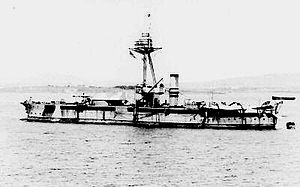|
HMS Raglan
HMS Raglan was a First World War Royal Navy Abercrombie-class monitor, which was sunk during the Battle of Imbros in January 1918. DesignOn 3 November 1914, Charles M. Schwab of Bethlehem Steel offered Winston Churchill, then First Lord of the Admiralty, the use of eight 14-inch (356 mm)/45 cal BL MK II guns in twin gun turrets, originally destined for the Greek battleship Salamis. These turrets could not be delivered to the German builders, due to the British blockade. The Royal Navy immediately designed a class of monitors, designed for shore bombardment, to use the turrets. ConstructionRaglan was laid down at the Harland & Wolff Ltd shipyard at Govan on 1 December 1914. The ship was named Robert E Lee in honour of the CSA General Robert E Lee, however as the United States was still neutral, the ship was hurriedly renamed HMS M3 on 31 May 1915. She was then named HMS Lord Raglan on 20 June 1915 and again renamed HMS Raglan on 23 June 1915. Career Raglan sailed for the Dardanelles in June 1915. She remained in the Eastern Mediterranean, based at Imbros. On 29 October, Raglan took part in the Third Battle of Gaza. On 20 January 1918,[1] while the battleships Agamemnon and Lord Nelson were absent, Raglan and other members of the Detached Squadron of the Aegean Squadron were attacked by the Turkish battlecruiser Yavuz Sultan Selim (formerly German battlecruiser SMS Goeben), the light cruiser Midilli (formerly German light cruiser SMS Breslau) and four destroyers. Raglan was sunk with the loss of 127 lives. The monitor M28 was also sunk in the same battle. Midilli and Yavuz Sultan Selim ran into a minefield while withdrawing; Midilli sank and Yavuz Sultan Selim was badly damaged. References
BibliographyWikimedia Commons has media related to HMS Raglan.
|
||||||||||||||||||||||||||||||||||||||||||||||||||||
